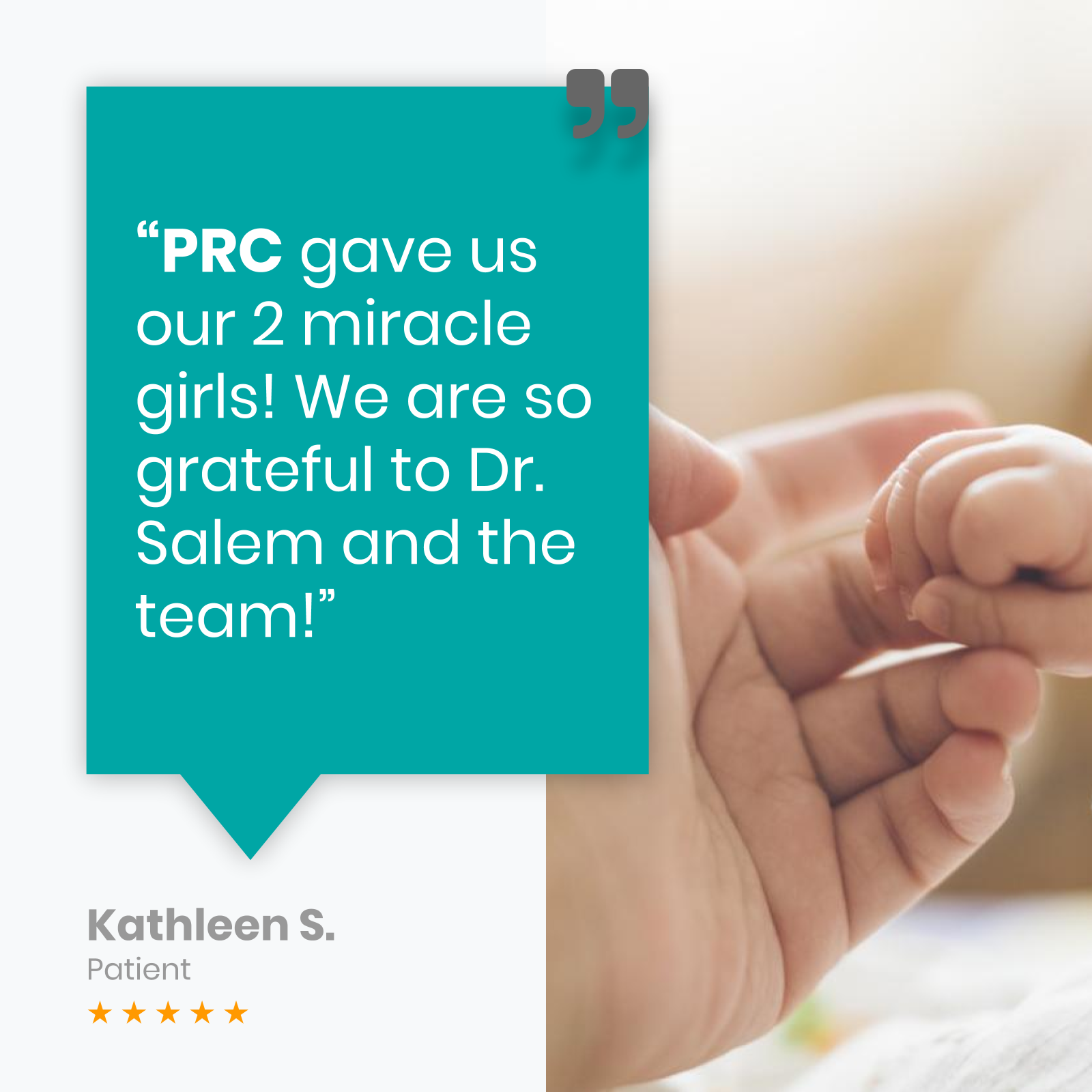Living with severe pelvic pain or challenges with conception caused by endometriosis can leave you feeling hopeless or frustrated. At Pacific Reproductive Center, we’re dedicated to uncovering the root causes of your symptoms through comprehensive endometriosis testing and providing expert care to support your path to a healthy pregnancy.
Keep reading to learn about endometriosis, its symptoms and causes, and available treatment options.
What Is Endometriosis?
Endometriosis is a chronic tissue disorder involving abnormal tissue growth (similar to the uterine lining) outside the uterus. The tissue may also grow on the ovaries, fallopian tubes, uterine ligaments, and other parts of the pelvis. It often causes inflammation and scar tissue formation, leading to severe pain and discomfort.
Symptoms of Endometriosis
The primary symptom of endometriosis is pelvic pain, which is often linked with menstruation. While pain is common during a menstrual period, those with endometriosis usually describe pain that is far worse than usual and worsens over time.
Additional symptoms of endometriosis include:
- Pelvic pain and cramping before, during, and after menstruation.
- Lower back and stomach pain.
- Pain during or after intercourse.
- Pain during bowel movements or urination (most common before or during menstruation).
- Heavy menstrual bleeding.
- Bleeding between menstrual cycles.
- Female-factor infertility.
- Fatigue.
- Diarrhea or constipation.
- Bloating.
- Nausea.
Causes and Risk Factors of Endometriosis
What Causes Endometriosis?
The exact cause of endometriosis is unknown. However, experts believe it involves a combination of several genetic and environmental risk factors.
Genetic and Environmental Risk Factors
- A family history of the disorder.
- Gene mutations that cause oxidative stress.
- A combination of multiple genes interacting.
- Exposure to endocrine disruptors (e.g., dioxins, early-age menstruation, air pollution, etc.).
- Excessive alcohol consumption and smoking.
- A high-fat diet.
- Prior pelvic surgery.
- Chronic stress.
How Lifestyle Choices May Influence Endometriosis Development
Lifestyle choices, like diet and physical activity, can significantly influence endometriosis development. Alcohol, caffeine, and tobacco consumption can influence estrogen levels in the body, which may increase your risk of developing endometriosis. Additional lifestyle choices that may increase your risk for this tissue disorder include:
- High consumption of red meat.
- High intake of trans fats.
- Low fiber intake.
- Low antioxidant intake.
- Low activity levels.
- Chronic stress.
How to Test for Endometriosis
Diagnostic Tests for Endometriosis
A minimally invasive laparoscopy procedure is the only way to confirm an endometriosis diagnosis. Additional diagnostic tests may include:
- Ultrasound or magnetic resonance imaging (MRI) to help locate large areas of endometriosis.
- Pelvic exam to check for cysts, scars, and tenderness.
The Role of Imaging and Laparoscopy in Diagnosis
Laparoscopy is considered the “gold standard’ for diagnosing endometriosis. However, imaging techniques like transvaginal (internal) ultrasound and MRI are also important for identifying and locating lesions before surgery. These tests help guide treatment planning and can help determine whether a surgical investigation is necessary.
When to Consider Endometriosis Testing
If you struggle with painful or debilitating menstrual cramps, abnormal or heavy menstrual flow, or pain during or after intercourse, talk to your healthcare provider to find out whether endometriosis testing is right for you. Additional symptoms may include:
- Pelvic pain that worsens during menstruation.
- Lower back pain.
- Extreme fatigue.
- Low mood or anxiety.
- Painful bowel movements or urination during menstruation.
- Difficulty getting pregnant.
If you have been trying to conceive for at least twelve months (six months if you’re over age 35), you may want to consider endometriosis testing. The skilled team at Pacific Reproductive Center specializes in diagnosing and treating several types of infertility.
Endometriosis and Pregnancy
How Endometriosis Can Affect Fertility
Endometriosis is commonly associated with an increased risk of infertility, affecting nearly 6.5 million women in the U.S. This disorder can make achieving pregnancy more difficult by distorting the pelvic anatomy and impairing fallopian tube function (abnormal tissue growth may block the egg path or damage sperm or fertilized eggs).
This condition can impact fertility in several ways, including:
- Scar tissue
- Inflammation
- Hormonal changes
- Pelvic anatomy
- Sperm function
Endometriosis and Pregnancy Complications
Women with endometriosis during pregnancy have an increased risk of complications, such as:
- Premature birth (before 37 weeks).
- Placenta previa.
- Miscarriage.
- Growth restriction due to inadequate uterine contraction and improper placentation.
- Cesarean section.
- Preeclampsia.
- Bowel perforation.
- Hemorrhage.
- Appendicitis.
- Hemoperitoneum (bleeding within the abdominal cavity).
Treatment Options for Endometriosis
Medical Treatments and Hormonal Therapy
Potential medical treatments for endometriosis symptoms, like heavy bleeding and pain, may include:
- Over-the-counter nonsteroidal anti-inflammatory drugs (NSAIDs) to help alleviate pain.
- Birth control pills to regulate the menstrual cycle and slow endometrial tissue growth.
- Progestin therapy to help control symptoms.
- GnRH agonist medications to reduce estrogen levels and slow endometrial tissue growth.
Surgical Treatments for Endometriosis
Potential surgical treatments to remove or destroy endometrial tissue may include:
- Laparoscopy to remove or destroy endometrial tissue.
- Laparotomy to treat severe endometriosis.
Alternative Therapies and Lifestyle Modifications
The most effective way to manage chronic pain associated with endometriosis is through a combination of traditional medical and surgical treatments with alternative therapies and lifestyle modifications. These may include:
- Acupuncture.
- Herbal medicine.
- Behavior modification (e.g., maintaining a healthy diet and getting regular exercise).
- Biofeedback.
- Physical therapy.
Request an Appointment
Pacific Reproductive Center is dedicated to providing personalized treatment and comprehensive endometriosis testing for conditions impacting fertility. If you’re facing fertility challenges, contact our team to explore your treatment options. We are ready to help alleviate your pain and discomfort and achieve a healthy pregnancy.
Please contact our helpful representatives to schedule a consultation today.
Treatments
Pacific Reproductive Center has been successfully aiding conception for over two decades. We optimize the conditions of fertility treatment to give every potential parent the greatest chance of successful childbirth.
Resources
We ensure that every patient fully understands their medical condition and treatment options available to them. We understand each patient is unique so we help guide you through the best option to support your own fertility journey.
Looking for the Best Fertility Clinic in Southern California?
Pacific Reproductive Center has four convenient locations throughout Southern California, making it easy for patients to receive quality care close to home. Each IVF fertility center has an on-site lab, next-generation services, and state-of-the-art equipment.
Whether in Glendale, Torrance, Irvine, or Corona, our world-class fertility doctors can help you build the family you’ve always wanted.
3720 Lomita Blvd, Suite 200 Torrance, CA 90505
116 E. Broadway, Suite 300 Glendale, CA 91205
10 Post Irvine, CA 92618
381 Corporate Terrace Corona, CA 92879




